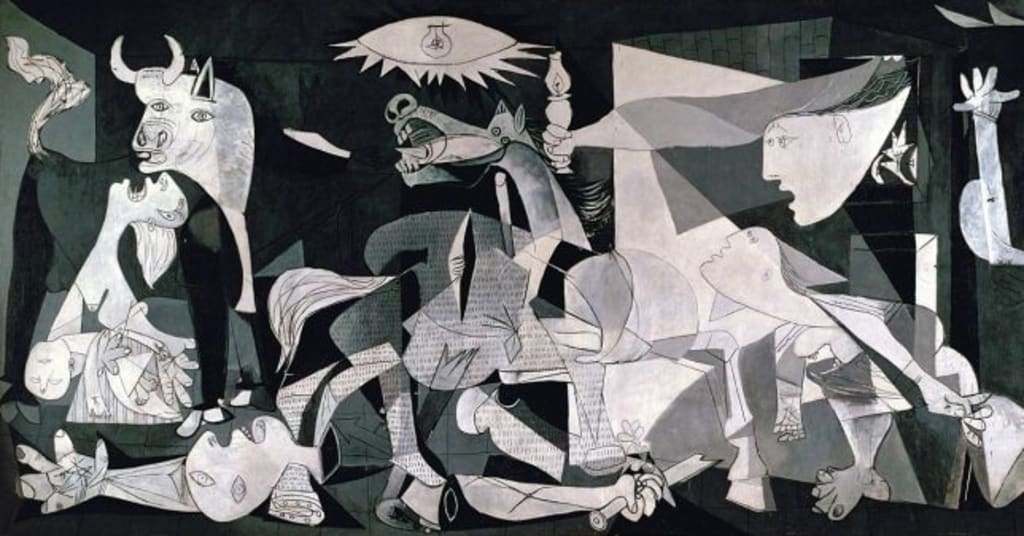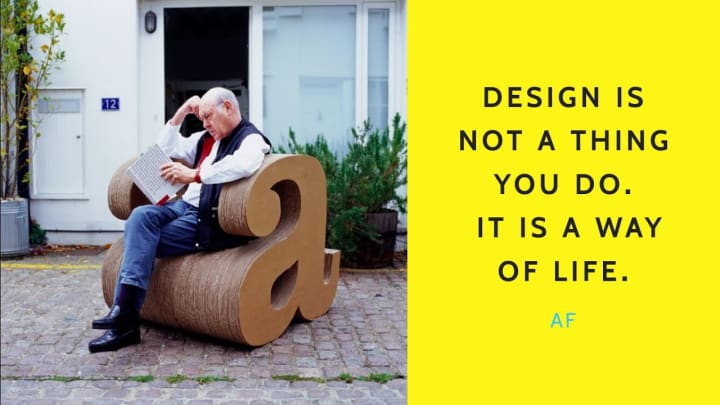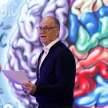Creative Confidence and Courage.
Why Creative Minds Seem Confident.

Whilst listening to a Richard Feynman, the celebrated physicist, lecture this week I was struck by how confident and assertive he seemed. Yet, a lot of what I've read about Feynman suggests that he was quiet and introverted. Although he was one of the last century's great scientific minds, it wasn't his knowledge that gave him his confidence. He could communicate and challenge big questions with ferocious tenacity. In my opinion, one of the most essential elements of creative or design-thinking is courage—the courage to step out of what you know and assume and find a new understanding of uncertainty. Courage is one of the critical elements of both confidence and creativity.
"We absolutely must leave room for doubt, or there is no progress, and there is no learning. There is no learning without having to pose a question. And a question requires doubt. People search for certainty."
Richard Feynman.
Confidence is not a matter of personality. Confidence means that you believe in and trust yourself and your capabilities. The same can be said of most great artists and designers, such as Picasso and Alan Fletcher. Their courage challenged received wisdom, and they trusted their instinct to step into uncertainty.

This is why, I believe that creative-thinking is not limited to the arts, but is potentially evident in everyone doing small, simple things such as improving a garden layout, changing a habit to paradigm shifts like quantum mechanics or the structure of DNA. Almost all decisions that require courage (all change requires courage), stepping into uncertain territory, or making new observations and associations is a form of creative thinking that requires creative courage. Small, creative decisions compound to make huge differences.
Creative Skill.
Creative confidence is a skill that can be learnt, that builds over time and repetition. We can learn to be courageous; it just takes practice. Everyone can think creatively, but not everyone dares to act on their instincts.
The physical and motor skills to say, play the violin, paint or sculpt, have been a matter of deliberate practice. If you put in enough hours of the right kind of practice, you will gain the motor skills, but, as many elite sportspeople have found what differentiates elite performers is the mental skills. One element of these skills is courage.
Confidence has nothing to do with being an introvert or extravert. A quiet person may be quietly confident within themselves, but not very demonstrative. An extrovert may lack real confidence but may appear to be confident because of the way they behave.
Courage.
People often don't lack confidence, they lack the courage to trust their instincts and intuitions and act on them.
Confidence, creative confidence, is a habit that can be developed by acting as though you already had the confidence you desire to have.
Brains are wired so that If we behave in a certain way, we will understand that we are acting in this way because we have reason to do so, and will gradually begin to settle this behaviour as the norm. WhenI we repeat these actions, they become a habit and eventually form beliefs, which then inform future actions, reactions and behaviour. This tricks our brains into believing that this behaviour is how we are (eventually we do become what we think and what we do).
This explains why change is so hard to bring about. We are reluctant to change how we behave because how we behave represents who we are, and we become very attached to who we think we are.
One of the fundamental principles of behaviour change is to be the person you want to be, rather than trying to become that person. Counter-intuitively, actions inform thinking. Thinking then causes us to behave in specific ways. To break the cycle and change takes courage.

Authentic Pride.
When we push ourselves to take action despite thinking (and overthinking), we instigate a small moment of courage. Authentic pride is something you acquire when you push yourself beyond your comfort zone and surprise yourself with what you can do and achieve.
Some years ago, whilst climbing a cliff face in the UK, I experienced a moment of mental hesitation and paralysis whilst approaching a small overhang. It's the moment when you've hesitated a moment too long, and your nay-saying mind has found a hundred reasons why this is a bad idea and shouldn't be attempted. In rock climbing confidence and courage often become raw and apparent.
Thinking and overthinking in these situations can be catastrophic. It's all about confidence, courage, self-belief, experience and skill. Experience only teaches you how to move in many different cases and is, of course, essential. With knowledge and skill, you build some confidence because you know your skill or knowledge is sufficient for the situation. Thinking, or rather, overthinking is fatal and paralyzing. Courage is needed when you are at the edge of your skill and knowledge. Confidence is the ability to believe in a possibility.
In his book "Flow", Mihaly Csikszentmihalyi identifies the moment you reach a state of mind where time disappears, and you are in-the-zone, which he calls, flow. That state of mind is achieved when you are a little beyond your skill-set (but not too far), and a little beyond your comfort zone (but not too far).
As I hesitated below the overhang, I set off an overthinking pattern and became paralyzed to the spot. Trying to figure out what my next hand or foothold would be, allowed my chattering monkey-mind to take over. I was frozen to the place. Climbing is a mental game as well as a physical game.
Fortunately, and finally, (and this is where some grit is needed) I was persuaded by my colleague (who was getting tired waiting for me) to stop thinking and "feel" my way past the overhang. To trust myself to climb further as he had already done. With my heart pounding in my temples, my breath short, I stretched up first one hand then found a foothold and passed the overhang. This was a small act of courage that gave me the confidence to trust my instinct (with a little help from my friend). The sense of achievement, having overcome my own mental demon, was far more significant.
In her book, Mel Robbins, the "Five Second Rule" uses a simple technique to overcome the inevitable hesitation and overthinking that happens when you give your mind time to talk you out of action. By counting 5.4.3.2.1. (like a rocket launch) Taking immediate action, you trick your mind into associating the short countdown with action that prevents your mind from killing your instinct.

The adjacent possible.
We are all bound by our assumptions, beliefs, habits, nagging doubts and misinterpretations, they form our mental and behavioural patterns, but we are not shackled to them, unable to change. Once we step outside of our assumptive bubbles, we step into areas of uncertainty. This is what Kauffman and Steven Johnson call, the adjacent possible. The adjacent possible is where we step when we make any thought that is outside what we know. A little beyond our skill and a little beyond our comfort zone. It requires courage.
Stepping into uncertainty is potentially a creative act. The more often you challenge assumptions, the more creative confidence you build until it becomes a creative habit.
Confidence in yourself is built through these small acts of courage. You prove it to yourself by doing it for yourself. You learn to trust yourself and make meaningful connections with yourself. Your confidence builds when you do small acts of courage that move you from comfort and uncertainty. Confidence is a skill that you build by pushing yourself to take immediate action.
Small decisions.
When you take little steps, making tough decisions, you are rewarded by living with the confident conviction that you trust and believe in yourself. Confidence builds with courage and doing things that affirm your sense of self. Small acts of everyday courage build confidence.
With small daily acts of courage, you prove to yourself that you can rely on yourself. Nothing is fixed or comes naturally to you until you practice it and repeat it. That's why you must practice acts of everyday courage.
When children learn to walk and fall down 100 times, they never think to themselves; "perhaps this isn't for me".
You can change every aspect of your life by taking action by taking small, deliberate and purposeful actions. A desire to do something meaningful requires deliberate action.
Having the courage to act outside of your norm is very difficult at first. It takes you outside of your comfort zone and into uncertainty. We are naturally afraid of the unknown, but you have to push beyond that zone to gain creative confidence. Doing things that scare you and succeeding makes you more confident. Significantly if you know, you can rely on yourself to get things done.

Control.
The more you push yourself, outside of your assumptions, the more you will believe that you have control of your life and the more confident you become. One of the most significant causes of stress is the feeling of a lack of control over your life.
In the famous Whitehall study, carried out over 10 years in the British Civil Service, researchers looked at the relationship between control, stress, and life longevity. What Michael Marmot, who led the team, found was that there is a causal link between the amount of control you have over what you do and the incidence of cardiovascular disease prevalence and mortality rates. So, the more you perceive that you have control over what you do, the less stress you will have (although you may have pressure, the more control you have over that pressure, the less stress you will feel) and, potentially, the longer your life expectancy, and life quality, will be.
We take control by taking deliberate and purposeful action. We gain confidence by the courage we apply to our decision-making.
Simple Small steps create a chain of events resulting in potentially huge changes—a ripple effect.
"The most difficult thing is the decision to act, the rest is merely tenacity".
Amelia Earhart.
Richard Feynman found his confidence by asking courageous questions. Picasso found his confidence by never resting on a successful style. Alan Fletcher found his confidence in his ability to challenge assumptions.
"I would rather have questions that can't be answered than answers that can't be questioned."
Richard Feynman.






Comments
There are no comments for this story
Be the first to respond and start the conversation.